
Twenty-six years ago, Cannabis made headlines at the Winter Olympics after Iconic Canadian Snowboarder, Ross Rebagliati took home gold at the Winter Olympics and tested positive for cannabis.
Over the last two decades, the cannabis landscape and conservation have shifted, yet THC remains on the banned substance list. Ross Rebagliati has been at the forefront of the conversation as an entrepreneur and cannabis advocate fostering the movement forward.
“It’s been nearly 26 yrs of pushing the envelope, first with cannabis legalization and now the business of it. At the center of it all is and has always been the level of acceptance, stigma and stereotype directed towards people who use cannabis and attempt to earn a living from it. As it now relates to a federally regulated market here in Canada, it’s about allowing the industry to expand into public consumption lounges and the option to buy cannabis drinks anywhere alcohol is sold. Infused dinners and desserts as well. Farm gate craft facilities and lower taxes. My passion for cannabis far exceeds any barriers that may exist… To me, Cannabis presents itself as an opportunity for change…”
-Ross Rebagliati
Pushing for change, Ross is hopeful that THC will be removed from the banned substances list in the future;
“It’s irresponsible to keep cannabis a part of the list of banned substances… It’s a natural product, it grows from the ground and you can use it in a healthy way…” Adding “CBD was taken off the banned substance list from WADA which is super positive.. But, THC is not something they should be concerned with… The list of banned substances is about a fair playing field and that’s it…”
-Ross Rebagliati
As the cannabis industry continues to flourish, Ross is putting a premium on transparent conversations and education.
In early 2023, the World Anti-Doping Agency’s Executive Committee approved the Prohibited list that includes Delta9-tetrahydrocannabinol, THC for international athletes, determining that cannabis use “violates the spirit of sport”.
The review was submitted to the Executive Committee by the LiEAG (List Expert Advisory Group) which followed three criteria guidelines established by the Code (the core document that harmonizes anti-doping policies, rules and regulations within sports organizations and among public authorities around the world). As per code guidelines, a substance must meet at least two of the criteria to be considered included on the List ;
- It has the potential to enhance sport performance
- It represents a health risk to the athlete;
- It violates the spirit of sports (as defined by the Code)
In late 2021 the Sports Cannabis community witnessed USA track icon, Sha’Carri Richardson receive a suspension for one month from the Olympic team for testing positive for THC. Subsequently, Richardson’s Olympic results were disqualified and she was not allowed to participate in the 100m race at the Tokyo Olympics.
Despite testimonials from athletes who were/are actively using cannabis, reviews of published surveys from around the world, scientific research, and relevant medical publications shared, LiEAG found that cannabis met two of the three criteria. It’s important to note that LiEAG also consulted with WADA’s Ethics Expert Advisory Group for the review, which still views Cannabis use as a violation of “Spirit of Sports”. WADA Director General Oliver Niggli released the following statement in a press release;
“WADA plans to continue research in this area in relation with THC’s potential performance enhancing effects, its impact on the health of athletes and also in relation to perceptions of cannabis from athletes, experts and others around the world.”
-WADA Director General, Oliver Niggli
Updated Guidelines
Under the new guidelines Delta9-tetrahydrocannabinol, THC will be prohibited in competition only and when the urinary concentration exceeds a threshold of 150ng/ml. Finding anything above the outlined levels would deem an athlete “significantly impaired” or a “frequent user”. In addition, the suspension time has been reduced substantially, from potentially two-four years to one month for athletes that can establish that cannabis/THC use occurred out of competition and was unrelated to sports performance.
Despite the world shifting, professional sporting leagues adopting new policies and pledging funds toward the research of cannabis, WADA remains a slow adopter of the plant.
Sports Cannabis
Toronto, Ontario
Canada
Join The Movement




